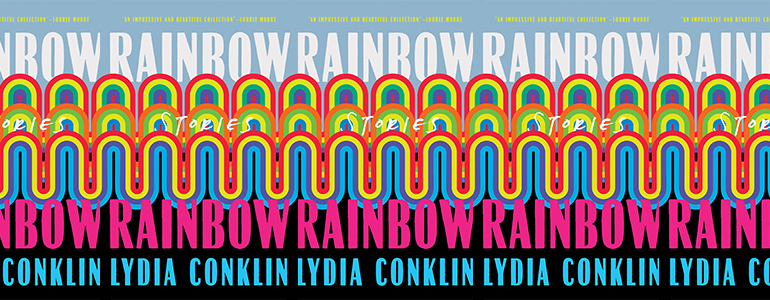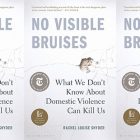Betrayal in Rainbow Rainbow

In their debut short story collection, Rainbow Rainbow, out today, Lydia Conklin examines what it’s like to inhabit a body and/or sexuality that is inherently uncomfortable—not because of one’s certainty about their identity but because of how others reject or suppress it. Conklin’s protagonists face the complicated, fraught choice to have top surgery, they transition while in relationships, they realize their queerness. Ranging from preteen to middle age, they highlight how queerness transforms experiences that are often quotidian (or simply nonexistent) in heterosexual relationships or in a cis-person’s coming of age. As a result of these experiences, queer people navigate a world that can be isolating, even inside a queer community, and in which losses and gains are painfully intertwined. Queerness is written on the body, Conklin’s stories reveal, and thus queer people may be betrayed by their body, their loved ones, or their community. To overcome this betrayal, one’s self is at risk, but also at risk is everything else.
“When I was thirteen, bow-legged with a rag of hair, the only person in our family with a Boston accent, Jen convinced her classmates that I was an unsavory male cousin,” Lillia, the protagonist of “Sunny Talks” says. Early on, their body indicated their queerness to themselves and others, which made them deeply uncomfortable in it and subject to frequent mockery from Jen, their older sister. As adults, the siblings are alienated and have never addressed Lillia’s gender identity, so Lillia is shocked by Jen’s all-in embracement of Sunny, Lillia’s nibling (the gender-neutral term for a sibling’s child). “She’s done everything for Sunny at every stage, each intervention and treatment on schedule,” they say. As a result, queerness is written on Sunny’s body in a different way from how it is written on Lillia’s—medical intervention has allowed Sunny to avoid puberty as a girl altogether. In videos on his YouTube channel, “Sunny Talks,” he “flaunt[s] his naked, scar-free chest,” a chest that will never bare the mastectomy scars of someone like Lillia, who was unable to avoid developing breasts. Lillia notices that Sunny “runs a palm through his hair. Such a boy gesture.” He has the body Lillia wanted for themselves, one that was never an option for them, one that Sunny was fortunate enough to be afforded by his mother and modern medicine. Lillia describes themselves, on the other hand, as “fifty, frumpy, misunderstood by all as asexual,” lacking masculine features though not embracing their feminine ones either. “[S]ometimes I can’t bear the fact that, if I was born a bit later, all I would’ve needed was injections,” Lillia says. “That my body never had to bloom into these curves…That now I’ll be stuck in this body forever, terrified of sex because my shape could never bump up against someone else, so my crushes burn out like stars.” Lillia’s body betrayed them in puberty, and as a result, so much of their life has been impossible, and impossible to bear.
Jen and Sunny, ironically, also betray Lillia by making no space for Lillia’s own queerness, which further confines them to the body they don’t belong in. When Jen asks Lillia to take Sunny to a convention for trans YouTubers happening near their home, Lillia’s anguish of being a closeted non-binary person is amplified in the presence of kids like Sunny “trotting so easy in their gender it’s like they never had to win it.” They continuously refrain from sharing their identity with Sunny in part because he’s a kid but also because of how he, like his mother, actively ignores or dismisses indicators of their identity. For example, Lillia avoids hugs (which awkwardly call attention to their unwanted breasts), a tell-tale sign another trans YouTuber, Button, recognizes when he hugs Lillia before assuring them that hugging will become less awkward when they adjust to their new body, mistaking Lillia for a trans woman. “They have me the wrong way around, but still, it’s something,” they think. Sunny, on the other hand, is quick to defend Lillia, and briefly seems to consider Button’s mistake an insult. The moment swiftly turns from one in which Lillia might be able to tell Sunny they’re non-binary to Sunny placing himself as the focus of this “moment of growth.”
All day, Lillia measures themselves against these trans bodies as they fantasize about their own transition, which sparks a range of emotions from sadness to jealousy. For Lillia, transitioning remains elusive. Lillia is misgendered a second time that evening, this time by the convention’s middle-aged keynote speaker. By this point, Sunny, exhausted by the day’s excitement, snaps, “‘You’re just, like some random weirdo,’” he says to Lillia, “‘But you’re lying, right?…You’re trying to fit in or something.’” Lillia responds, “‘Don’t worry…Nothing has to change.’” Sunny reacts to Lillia passively sharing their news not by recognizing that they have done something incredibly difficult and have gone through fifty years of life in a body of the wrong gender but by accusing Lillia of not being there for him enough. Lillia has already sensed a lack of support from their colleagues, and this moment with Sunny, a second generation of unsupportive family, indicates to them that transitioning would mean near total loss. What more can they bear? the question becomes—Losing everything or denying themselves the right body?
Coco, in “Pioneer,” experiences a similar inability to express her gender identity. In fifth grade, her body is on the cusp of change, of its betrayal, which is amplified when she is assigned the role of matriarch in the fifth-grade classes’ simulation of the Oregon Trail. The journey is iconic, one the students have “chattered about…since kindergarten, when they’d first glimpsed the wagons pulled through the field by what looked like small adults. All through middle and high school, the Oregon Trail would be reminisced about as the pinnacle of their education.” Coco is eager to be part of this “culmination of the fifth graders’ hard work,” but the role of matriarch complicates her excitement to participate. She is “uneasy in dresses and skirts. The wind could catch the fabric and expose the part of her she hated most, that felt so wrong and that she pretended had withered off her.” While bathing, she can’t bear to look at her developing body, and being a matriarch means these unwanted female traits will be thrown in her face, just like her own name, “embarrassingly girlish, the verbal equivalent of balloons stapled to her chest.” Coco yearns instead “to be…a boy[,]…to wear short pants and follow behind a party, providing for anyone who was hungry. She wanted to be a smooth-faced, short-haired colonial boy.” Being a boy feels right to Coco, and as the simulation progresses, she gains more recognition of why she covets this position over a position that is perceived by others as more desirable, why she covets this position even as her peers viciously ostracize her, and she also comes to realize that her desire to be a boy extends beyond the trail.
When Coco pleads with her classmates to switch roles, they are baffled by her request since being a matriarch is viewed as “‘an incredible honor.’” Another matriarch tells her, “‘That’s stupid. Ms. Harper says we have to accept our station.’” But to accept her station is to reject herself. Rather than doing so, Coco takes up a family’s offer to be an ox who pulls their wagon, a position they make up, obviously relishing its dehumanizing nature. Being an ox is more acceptable to Coco than performing femininity. Before the big day, “Coco stuffed yellow felt triangles with dry grass for horns and affixed them to the cap of her headgear. She prepared a poncho that simulated the powerful shoulders of an animal and tied a piece of rope to her belt for a tail.” Coco’s mother withholds what she thinks Coco looks like, but the kids at school are openly homophobic. A patriarch tells Coco she looks gay: “‘Like a gay person? Ever heard of one? They’re actually real. It’s sick.’” “‘You’d rather be livestock than our mother, huh?” her ex-son says. “‘You’d rather be on your hands and knees and, like, pooping in the grass, huh?’” The patriarch of her family tells her, “‘You’re worse than gay…You’re not even a person. You’re an ugly ox with ox balls. You’re a gross animal.’” This widespread homophobia further alienates Coco, but she refuses to allow this day to be taken from her. Even as she “wonder[s] if she actually was an animal,” she continues along the trail. She finds herself thinking “[t]hat explained why she didn’t feel like anyone else at school. She certainly wasn’t normal,” so she continues to embrace her position, even when her classmates begin to physically punish her for being different. They forbid her from eating rations and demand that she pull the wagon across a creek while they weight it down with their bodies. Coco valiantly bears this cruelty and begins to understand the simulation as a metaphor, viewing herself as “a true pioneer, one ocean behind her and another—one she’d never seen and might never reach—ahead. She didn’t want regular school to resume. She wanted to survive, to stay in the game.” Regular school fixes Coco’s identity to girlhood, to the breasts that will continue to grow and the name that doesn’t suit her, while traversing this trail releases Coco from it.
In the end, Coco is the only fifth grader who survives—though it’s unclear if the teachers, who watched the whole spectacle, have done so to discipline the bullies or in recognition of Coco’s perseverance. Regardless, now she knows that her survival will be more complicated than the trek across the field at the end of elementary school. For Coco, “the end of the simulation was just the beginning…She would go on her journey now. She would set off.” Coco can’t or doesn’t want to hide that she is different, even when it means ostracization. She’ll have a hard time on her path forward, but she has the tenacity to keep going, even if she must do so alone.
Romantic relationships prove just as painful and isolating as these experiences, as bodies are inevitably part of their development. Changing one’s body, then, means a fundamental change in the relationship. In “Pink Knives,” the protagonist, living across the country from their girlfriend, relishes their “binder that has broken a rib or two but that makes [them] ecstatic anyway, in an embarrassingly childish way, whenever [they] pull it on, so much so that [they’d] never take it off if it didn’t stop [them] from breathing and digesting food.” Soon, they’ll undergo top surgery, which their girlfriend, who struggles with their pronouns, is ambivalent—at best—about, rather than supportive of the changes the protagonist seeks for their body. Still, the protagonist imagines both their girlfriend and their scar in the future: “Sometimes I imagine the scar, jagged and wine red, crusty with old blood, terrifying my girlfriend as she bathes me even as she pretends it doesn’t, steadying her hands on the sponge on my spine.” What will a relationship look like in which these two people stay together despite this jagged, wine-red scar that is desirable to only one of them?
Asher, in “Cheerful Until Next Time,” also decides to move forward with top surgery while in a relationship with a woman, who breaks up with him afterward. Before surgery, Asher discovers his girlfriend has written in her journal: “This is so dubious, this transition bullshit, like what the fuck is she doing? I’m not even breathing right now. I’m, like, sick. Because how can I promise to love some boy I’ve never met?” As much as he had once loved his girlfriend, his body is more important to him, and it’s clear, anyway, that his girlfriend views changing his body as changing his entire self. After surgery, Asher uses the anti-scarring gel only once because “[h]e cherished the reminder that this body wasn’t his birthright.” But it is still his body, and he wants his queerness visible; it’s a gain that outweighs the loss.
Daisy, in “Boy Jump,” faces a similar situation: “She doted on my body,” they say of their girlfriend, “and I was afraid that, if I altered anything, she’d bail.” The body that their girlfriend loves is the body that makes Daisy deeply uncomfortable. In a swimsuit, even a “queer-friendly” one “exposing [their] curves . . . was [their] personal tailored hell.” Daisy uses time apart from their girlfriend to fully commit to their decision to go through with surgery. “Yes, I’m going to slide under the knife and fill my body with hormones and change my name to Something and become a boy, honor that earnest impossible childhood wish garbled by a two-decade smorgasbord of female-specific joy and trauma,” they write in their journal. In the end, their relationship with their body trumps their relationship with a partner. But living fully in their gender-identity comes with a secondary side effect—they are moving from the oppressed (woman) to the oppressor (white man). “How awful to be suddenly accused of heterosexuality, even if it was true,” Daisy says. “A straight white man—that was my future…I’d turn invisible, privileged, easy in the world. Who would I be when I wasn’t exactly me anymore?” Not only does Daisy risk losing their partner in transitioning, but they also sacrifice aspects of their identity that extend beyond the body. They acknowledge that the body complicates self, as Asher’s girlfriend feared, but like Asher and other protagonists in Conklin’s collection, living in a body of the wrong gender is a form of erasure and betrayal that leaves little room for one’s self.
The isolation and cruelty Conklin’s collection explores is devastating. None of their characters win completely—an impossibility—but at least they all accept their queerness, even when they feel unable to express it. “I should be grateful that the world changed in time for Sunny,” Lillia says, “But as it is, I wish the shift hadn’t happened too late for me to ever be beautiful in my right body but too soon for me to die in the peace of never having known another way.” The world is unfair, Lillia says, when it comes to being queer. While the body betrays, the betrayal of those around queer people, however, who see queerness written on their body and punish them for it, is the cruelest betrayal of all.
This piece was originally published on May 31, 2022.



